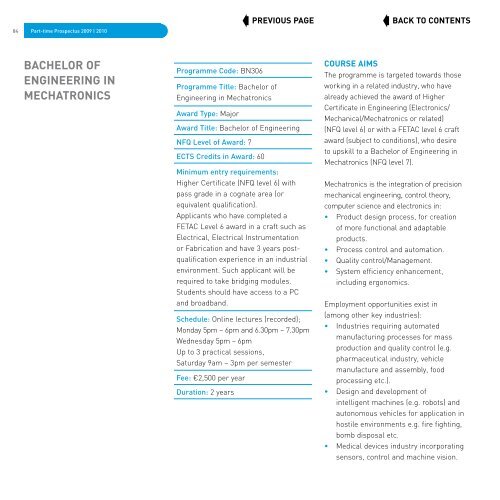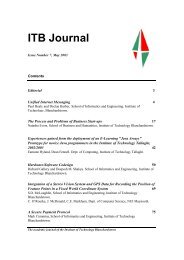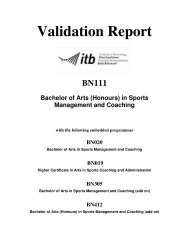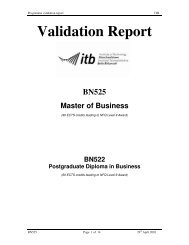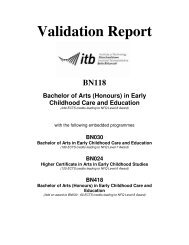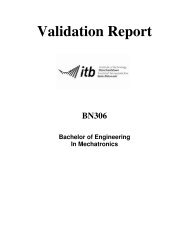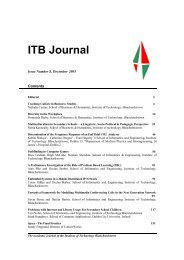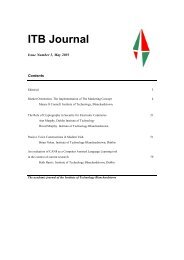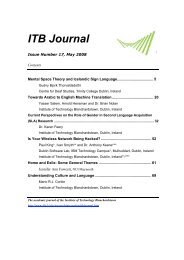new horizons - Institute of Technology Blanchardstown
new horizons - Institute of Technology Blanchardstown
new horizons - Institute of Technology Blanchardstown
You also want an ePaper? Increase the reach of your titles
YUMPU automatically turns print PDFs into web optimized ePapers that Google loves.
Previous Page BAck to Contents Next Page ➧<br />
BAck to Contents<br />
84 Part-time Prospectus 2009 | 2010<br />
Engineering Courses 85<br />
BACHELOR OF<br />
ENGINEERING IN<br />
MECHATRONICS<br />
Programme Code: BN306<br />
Programme Title: Bachelor <strong>of</strong><br />
Engineering in Mechatronics<br />
Award Type: Major<br />
Award Title: Bachelor <strong>of</strong> Engineering<br />
NFQ Level <strong>of</strong> Award: 7<br />
ECTS Credits in Award: 60<br />
Minimum entry requirements:<br />
Higher Certificate (NFQ level 6) with<br />
pass grade in a cognate area (or<br />
equivalent qualification).<br />
Applicants who have completed a<br />
FETAC Level 6 award in a craft such as<br />
Electrical, Electrical Instrumentation<br />
or Fabrication and have 3 years postqualification<br />
experience in an industrial<br />
environment. Such applicant will be<br />
required to take bridging modules.<br />
Students should have access to a PC<br />
and broadband.<br />
Schedule: Online lectures (recorded);<br />
Monday 5pm – 6pm and 6.30pm – 7.30pm<br />
Wednesday 5pm – 6pm<br />
Up to 3 practical sessions,<br />
Saturday 9am – 3pm per semester<br />
Fee: €2,500 per year<br />
Duration: 2 years<br />
COURSE AIMS<br />
The programme is targeted towards those<br />
working in a related industry, who have<br />
already achieved the award <strong>of</strong> Higher<br />
Certificate in Engineering (Electronics/<br />
Mechanical/Mechatronics or related)<br />
(NFQ level 6) or with a FETAC level 6 craft<br />
award (subject to conditions), who desire<br />
to upskill to a Bachelor <strong>of</strong> Engineering in<br />
Mechatronics (NFQ level 7).<br />
Mechatronics is the integration <strong>of</strong> precision<br />
mechanical engineering, control theory,<br />
computer science and electronics in:<br />
• Product design process, for creation<br />
<strong>of</strong> more functional and adaptable<br />
products.<br />
• Process control and automation.<br />
• Quality control/Management.<br />
• System efficiency enhancement,<br />
including ergonomics.<br />
Employment opportunities exist in<br />
(among other key industries):<br />
• Industries requiring automated<br />
manufacturing processes for mass<br />
production and quality control (e.g.<br />
pharmaceutical industry, vehicle<br />
manufacture and assembly, food<br />
processing etc.).<br />
• Design and development <strong>of</strong><br />
intelligent machines (e.g. robots) and<br />
autonomous vehicles for application in<br />
hostile environments e.g. fire fighting,<br />
bomb disposal etc.<br />
• Medical devices industry incorporating<br />
sensors, control and machine vision.<br />
This programme allows students to<br />
achieve the award <strong>of</strong> Ordinary Degree<br />
in Engineering in Mechatronics. This<br />
is a widely recognised and accredited<br />
multidisciplinary engineering<br />
qualification. It will give students the<br />
necessary knowledge, know-how and<br />
skills to advance in their employment<br />
as a technician in a relevant industry. It<br />
will also give students the opportunity<br />
to proceed to further studies in<br />
Mechatronics (i.e. honours level studies).<br />
COURSE CONTENT<br />
Subjects covered in the programme<br />
include aspects <strong>of</strong> electronics,<br />
mechanics, automation, production,<br />
s<strong>of</strong>tware engineering and mathematics,<br />
with a strong emphasis on practical<br />
skills. A significant aspect <strong>of</strong> the<br />
programme is the undertaking <strong>of</strong> a<br />
project, in which the theoretical and<br />
practical skills developed during the<br />
programme are brought together<br />
in the design and construction <strong>of</strong> a<br />
Mechatronics solution to an engineering<br />
problem. A detailed breakdown <strong>of</strong> the<br />
modules is provided in the course<br />
schedule.<br />
At ITB we have a range <strong>of</strong> fully equipped<br />
laboratories and computer rooms. These<br />
facilities allow students to successfully<br />
design, test and build engineering<br />
projects. The computers have the latest<br />
s<strong>of</strong>tware packages in computer aided<br />
design, instrumentation and control,<br />
simulation and programming.<br />
COST and FEES<br />
The programme fee will be €2,500 per year.<br />
This fee includes all the learning and<br />
support sessions, including necessary<br />
learning material. Each student will<br />
be provided with a toolkit that contains<br />
all the necessary tools to complete the<br />
practical elements <strong>of</strong> the course. Access<br />
and support will be provided to email and<br />
online learning resources. Any necessary<br />
s<strong>of</strong>tware will be provided to complete<br />
additional coursework at home.<br />
COURSE DELIVERY<br />
This course will be <strong>of</strong>fered over 2 years in<br />
four semesters. The lecture content will be<br />
provided as ‘live’ on-line lectures. These<br />
are recorded and can be viewed again at<br />
a time more convenient to the student.<br />
Students will be required to attend ITB for<br />
up to four practical days per semester,<br />
these normally take place on a Saturday.<br />
Tutorials and continuous assessment will<br />
be provided online as applicable.<br />
As Mechatronics is the integration <strong>of</strong><br />
precision mechanical engineering,<br />
control theory, computer science and<br />
electronics the first semester will <strong>of</strong>fer<br />
students elective subjects in a discipline<br />
they haven’t studied before e.g. a<br />
student with an electronics background<br />
will be required to take a mechanics<br />
module. Students with a FETAC level 6<br />
qualification will be expected to sit all<br />
elective subjects as their bridging studies<br />
for acceptance onto the programme.<br />
Occasionally during the programme<br />
students may be expected to be available<br />
for accelerated delivery <strong>of</strong> certain practical<br />
modules. The time and duration <strong>of</strong> these<br />
modules will be agreed in good time.<br />
SUPPORT<br />
Resources such as lecture notes, past<br />
exam papers, tutorial etc. will all be<br />
made available online, for access at<br />
home or work.<br />
Through discussion groups, forums as<br />
well as e-mail and phone support there<br />
is a wide range <strong>of</strong> support available to<br />
you from both your lecturers and your<br />
class colleagues.<br />
Computer facilities are available to you<br />
in ITB at all times once registered as a<br />
student. Computer application training<br />
is given during the first semester. Online<br />
material is available to students who<br />
have internet access. In addition to web<br />
resources the library stocks many <strong>of</strong> the<br />
texts referred to in class.<br />
ASSESSMENT<br />
There is a wide range <strong>of</strong> assessment<br />
procedures employed in this programme.<br />
Assessment will range from laboratory<br />
assignments to online tests. Many <strong>of</strong> the<br />
modules will be continuously assessed<br />
throughout the semester, and the final<br />
module mark arrived at by a combination<br />
<strong>of</strong> final exam and continuous assessment.<br />
In some cases modules are assessed by<br />
ongoing continuous assessment only.


